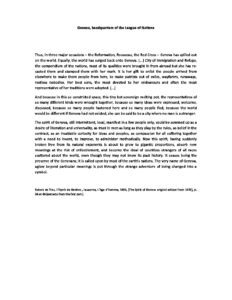Thus, in three major occasions – the Reformation, Rousseau, the Red Cross – Geneva has spilled out
on the world. Equally, the world has surged back onto Geneva. […] City of immigration and Refuge,
the compendium of the nations, most of its qualities were brought in from abroad but she has recasted
them and stamped them with her mark. It is her gift to enlist the people arrived from
elsewhere to make them people from here, to make patriots out of exiles, wayfarers, runaways,
restless nobodies. Her best sons, the most devoted to her endeavours and often the most
representative of her traditions were adopted. […]
And because in this so constricted space, this tiny but sovereign melting pot, the representatives of
so many different kinds were wrought together, because so many ideas were expressed, welcome,
discussed, because so many people hastened here and so many people fled, because the world
would be different if Geneva had not existed, she can be said to be a city where no man is a stranger.
The spirit of Geneva, still intermittent, local, manifest in a few people only, could be summed up as a
desire of liberation and universality, as trust in men as long as they play by the rules, as belief in the
contract, as an insatiable curiosity for ideas and peoples, as compassion for all suffering together
with a need to invent, to improve, to administer methodically. Now this spirit, having suddenly
broken free from its natural exponents is about to grow to gigantic proportions, absorb new
meanings at the risk of enfeeblement, and become the ideal of countless strangers of all races
scattered about the world, even though they may not know its past history. It ceases being the
preserve of the Genevans; it is called upon by most of the earth’s nations. The very name of Geneva,
aglow beyond particular meanings is put through the strange adventure of being changed into a
symbol.
